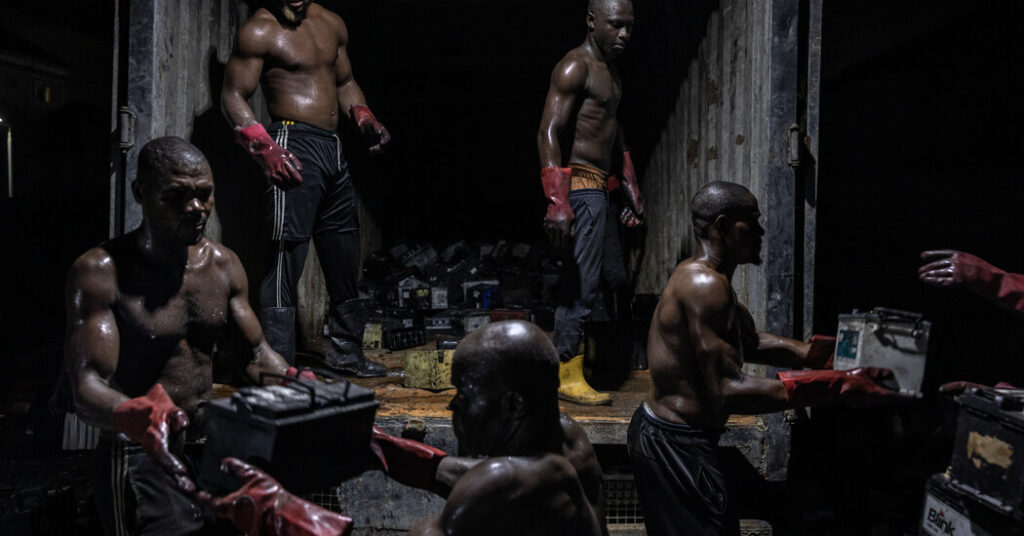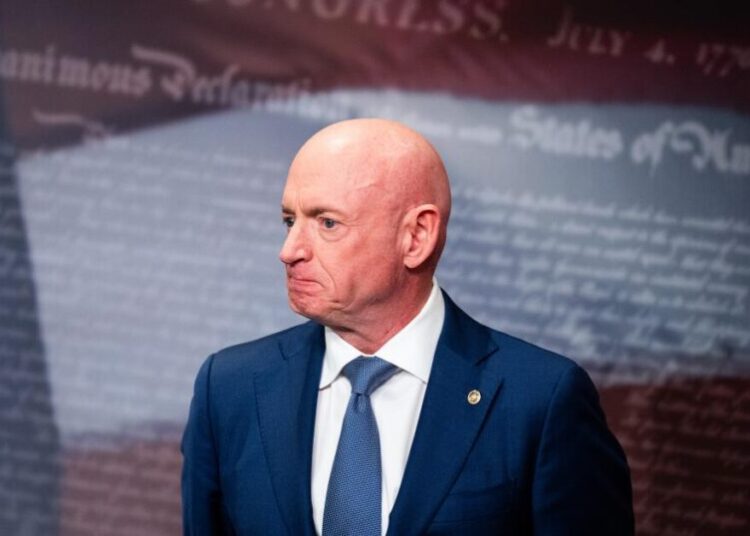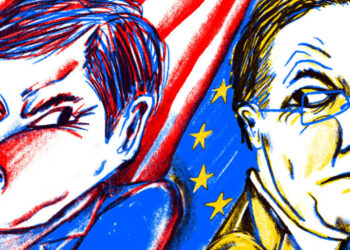At Ford Motor Company headquarters near Detroit, Phillip Toyne, a shy Australian lawyer, warned executives in 2005 that the lead inside car batteries was poisoning people.
Lead is an essential, but toxic, element of car batteries. As demand rose, the auto industry increased its use of recycled lead. But many recycling factories around the world were pumping toxic smoke into communities.
Mr. Toyne, records show, pitched a solution: a program in which inspectors would certify factories that operated cleanly. Car manufacturers and battery makers could then market themselves as buying only from environmentally friendly suppliers.
It went nowhere.
An investigation by The New York Times and The Examination showed that African factories have poisoned people while recycling lead to be sold to American companies. Children near one cluster of factories outside Lagos, Nigeria, had lead in their blood at levels that could cause lifelong brain damage, according to testing commissioned as part of the investigation.
Most carmakers, including Ford, declined to comment on the findings, saying that they rely on their suppliers to follow the law and corporate codes of conduct. A few companies, such as Volkswagen and BMW, promised to start internal reviews.
But records and interviews with industry executives and health and environmental advocates show that automakers and their suppliers have known for almost three decades that recyclers were releasing lead into the air as they melted down old batteries.
Time and again, car and battery manufacturers opted not to act and blocked efforts to address the problem. When the world’s largest car companies wrote their environmental policies, they excluded lead. They did so even as a patchwork of shoddy factories in Ghana, Nigeria and Tanzania provided more lead for their batteries.
Even at low levels, lead exposure can cause neurological damage and contribute to heart disease and stroke. Each year, lead poisoning is estimated to kill more than 1.5 million people, most of them in developing countries.
Ford did not respond to questions about Mr. Toyne’s pitch. But notes and documents summarizing the meetings show that executives were intrigued by the program, called Green Lead. They thought it could appeal to environmentally conscious customers.
But the following year, 2006, Ford recorded what at the time was its worst financial loss ever. Bill Ford, a sustainability champion, stepped down as chief executive officer.
As the auto industry struggled through the subsequent financial crisis, other car companies and battery retailers also declined to sign on. Green Lead collapsed.
Battery makers buy some of their recycled lead from global trading companies, which buy from recyclers around the world.
Addressing lead pollution and other environmental problems proved “financially challenging,” recalled Bernd Gottselig, a retired Ford executive who was involved in talks about Green Lead. “Several ideas would have required setting up completely new and unique supply chains,” he said.
Michael Rae, who was working on a program to certify metals and minerals in the jewelry industry at the time, sat in on a Green Lead meeting. He said it posed a public relations challenge for automakers: By touting their environmental commitment, they’d be calling attention to their reliance on a metal that has been known for centuries to be toxic.
“My recollection is that there was active resistance from the motor vehicle industry to the idea of saying ‘green lead’ because of the implication that there was ‘bad lead,’” Rae said.
A Honda-owned motorcycle company warned of sick children
As the Green Lead initiative stalled in Detroit, another proposal was taking shape in India. In 2007, executives at Hero Honda, the world’s largest motorcycle manufacturer at the time, realized that they would need ever more lead over the coming decade.
Executives knew what was likely to happen as a result. A company presentation said the consequences of increased lead production included “ill health of innocent persons / children.”
So the company, which was co-owned at the time by Honda Motor Company, signed on to a pilot program in India in which it would buy batteries only from manufacturers that had passed external audits and had been certified as reducing lead emissions.
The company hoped that would encourage competitors to invest in better technology, according to a corporate presentation.
The program was called BEST Standard 1001. The United Nations, which had provided funding to Green Lead, supported the initiative.
As with Green Lead, advocates lobbied carmakers around the world, hoping to take the project global.
“As you are aware, lead poisoning is an extremely serious issue in many parts of the world,” organizers wrote to car companies, including DaimlerChrysler and Ford.
None of them signed up.
Major Indian battery manufacturers also stayed away, said Perry Gottesfeld, executive director of OK International, a nonprofit health research organization that helped design the project.
Honda declined to comment on the program. It said it supported the ethical sourcing of materials and was “committed to the responsible management of the batteries of today and tomorrow.”
One company that declined to participate in the pilot program was Mitsubishi.
“We are aware of lead poisoning, and understand your gist,” Eizo Tabo, the manager of environmental and recycling programs at Mitsubishi, wrote at the time. But the company said its batteries came from Japan, not India. “We do not have extra resources to be involved in the overseas project for recycling lead batteries,” Mr. Tabo wrote.
In the years that followed, lead from polluting factories has seeped further into the global supply chain. Japan, for example, has imported recycled lead from Nigeria in the past decade, trade records show.
A Mitsubishi spokesperson said it is working to eliminate lead in its products and that it has not identified serious risks of human rights violations in any of its supply chains.
World’s largest battery maker blocked new standards
In December 2011, a New York Times article described a “putrid mist” falling upon a town in Mexico after a factory there began recycling old American car batteries. An infant convulsed with seizures. A teenager suddenly developed nosebleeds and stomachaches.
The article followed a research paper by a pair of environmental groups. Researchers noted that as the United States tightened environmental restrictions, battery exports to Mexico for recycling increased, leading to “significantly higher occupational and environmental exposures.”
That troubled Bob Holcombe. As a director with the General Services Administration, he was responsible for more than 600,000 U.S. government vehicles. He contacted a group called ASTM International and asked for help.
ASTM answers all kinds of complicated questions for governments and industries: How strong must a bridge’s steel beams be? How tall should the fences around public playgrounds be? How fast can a roller coaster safely accelerate?
Holcombe asked ASTM to come up with standards for lead battery recycling.
No company had more at stake than Johnson Controls, the world’s largest automotive battery maker at the time. A new set of industry standards could have meant higher production costs and increased attention on its supply chain.
In early December 2012, battery makers, lobbyists and environmental advocates arrived at the G.S.A. office in Washington, two blocks from the White House. They were there to vote on whether ASTM International should create a committee on battery recycling, the first step toward setting an industry standard.
ASTM’s rules required a simple majority to form a committee, and anyone who attended the meeting could vote. “Johnson Controls showed up at that meeting and, apparently, had read the bylaws very well,” said Tim Whitehouse, an energy consultant and former EPA lawyer who was there.
Of the 98 attendees listed as eligible to vote, 80 represented battery makers — including 50 representatives of Johnson Controls. The vote failed.
“It was pretty clear in the room that we had gathered to do this and then Johnson Controls decided they didn’t want it,” said James Meinert, who attended the meeting on behalf of the Natural Resources Defense Council.
Johnson Controls has since sold its battery business, which rebranded as Clarios. It did not answer questions about the meeting. “Clarios maintains an unwavering commitment to advancing stringent global standards for battery manufacturing and recycling,” the company said.
Car companies excluded recycled lead from their sustainability reports
For years, the world’s largest car companies have celebrated their efforts to protect people and the planet.
They supported a 2013 global agreement to limit the trade of mercury, which had been used in vehicle components. And after news reports identified child labor at mines in the Democratic Republic of Congo, car companies pledged to use only ethical suppliers for gold and the metallic ore coltan, which is used to make automobile electrical systems.
“These minerals hit the news and you had all these human rights violations going on,” said Steven B. Young, an industrial ecologist and professor at the University of Waterloo in Ontario. “Some companies said, ‘Holy crap, we don’t want this in our supply chain. What can we do?’
“I don’t think lead has had that moment,” he said.
All major car companies now identify minerals and metals that are known to harm the environment and human health if they are obtained irresponsibly.
Hyundai, for example, keeps a list of minerals that are important to the “future and environment of mankind.” It requires that suppliers obtain those minerals ethically. General Motors has placed six metals under heightened scrutiny. Neither company addresses lead.
Other companies responded but did not answer questions from The Times and The Examination. Some pointed to broad commitments to buy or recycle all products responsibly. Volvo and Mitsubishi shared policies that do list lead among the metals they monitor. Nissan said its policy is to phase out the use of lead “where technically feasible.”
In July, Ford released its most recent sustainability report, announcing that it was “voluntarily holding itself accountable to a new level of rigor.”
“Supply chain transparency and human rights protection go hand in hand,” Ford wrote.
The report says nothing about lead.
Mr. Toyne died in 2015. His partner in Green Lead, Mick Roche, said he learned from its failure.
Mr. Roche went on to help set up one of the first global certification systems for diamonds and gold. It was easier to persuade retailers and manufacturers to care about precious metals in rings, necklaces and earrings than the lead hidden inside car batteries, he said.
“It was just one of those things with lead,” Mr. Roche said. “It didn’t have the sex appeal of everything else.”
Peter S. Goodman contributed reporting.
The post The Auto Industry Was Warned: Battery Recycling Was Poisoning People appeared first on New York Times.




